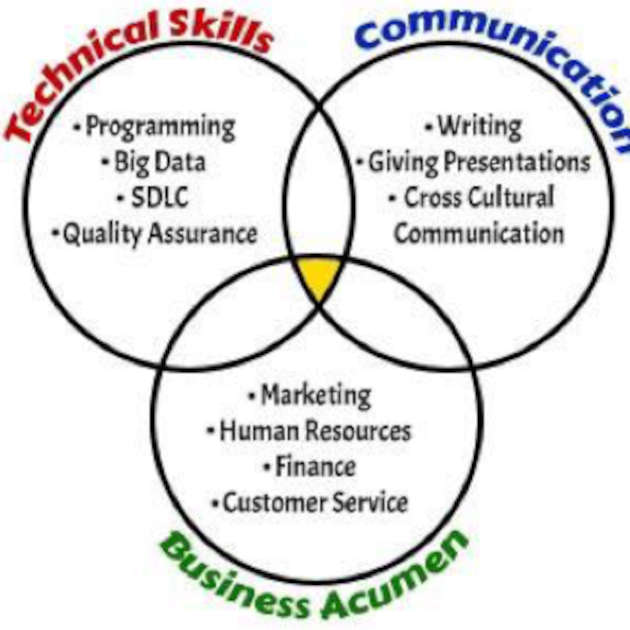It’s finally summer. You have successfully completed your Systems Analysis, Data Communications, Organizational Behavior and Object-Oriented Programming classes. Perhaps you are sitting in the Student Union reviewing the Career Expo’s listing of local employers and their current open positions: Software Engineer, Database Analyst, Project Coordinator, Systems Analyst, Analytics Consultant, Data Scientist. While you have enough classroom knowledge for each job, you seek an opportunity that will utilize all of your broad academic training.
If you find yourself asking “what” and “why” on a daily basis, you will enjoy the business analyst career path. I’m typically excited about acquiring new furniture, but the thought of putting it together by looking at a manual doesn’t galvanize me. Similarly, understanding what system capabilities are desired and why they will benefit users instead of evaluating a Unified Modeling Language model to select the most optimized algorithms seems a bit more appealing.
The business analyst will use tools to review mountains of Google data traffic without once being concerned about the mining techniques used by the tool to conclude that during the World Cup many people from southern American states search for countries like Cote d’Ivoire and Estonia. Even though business analysts don’t code and only occasionally write software test plans, knowing how software gets developed from the moment an idea is discussed on a whiteboard to releasing a software product into the customer’s hands certainly makes the job easier — and you a more sought-after employment candidate. Having the ability to eloquently explain to your boss why your project is delayed as a result of a faulty integration point that needs to be stress-tested for two days is very valuable in today’s “just speak to me in plain English” corporate environment.
The business analyst role fulfills the dream of speaking multiple languages and interacting with different internal and external stakeholders. It might not be as thrilling as flirting in Italian when your company’s leaders and clients speak their language, but the underlying message will be translated to one of improving operations, increasing revenue, leveraging technology or cutting costs.
As a business analyst, you will be given the challenging task of identifying business, functional, data and nonfunctional requirements in varying degrees of naming, but hopefully in the same order. Each of these types of requirements is gathered throughout an elicitation process by asking specific questions, such as:
- “Which data elements should a recruiter see when searching for a candidate in the HR system?”
- “How many payment transactions are expected during peak hours for the credit card processing system?”
- “What should the system’s response time be when there are more than 500,000 users uploading photos to the company’s website?”
- “What type of offers would the marketing team like to send to individuals 25 years of age who reside in Lubbock, Texas, and enjoy Vietnamese food?”
- “Which data sources are used the most when profiling customer data?”
- “Which security protocols need to be followed when verifying a customer’s identity upon account inquiry?”

With many companies embracing the software-as-a-service model, initiating big data programs and establishing communities of excellence based on job families, the business analyst of the future will be in the center of a cross-functional environment harnessing and delivering intelligence — much like a neuron processing and transmitting information throughout the nervous system. The profession will continue to grow as software becomes more complex and integrated in our lives. Whether you’re hired by a healthcare company looking to build telemedicine solutions for primary care physicians, a management consulting firm, or decide to form your own company to build the next best social media platform, your passion for technology and business, coupled with your effective communication style, will set you on the right path toward an exciting future.





